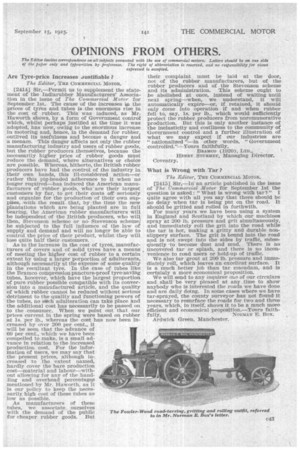OPINIONS FROM OTHERS.
Page 27

If you've noticed an error in this article please click here to report it so we can fix it.
The Editor ifrvites eorrestoncience on cat subjects connected with the use of commercial motors: Letters should be on one site of the paper only and typewritten by preference. The right of abbreviation is reserved, and no responsibility for views
expressed is accePted.
Are Tyre-price Increases justifiable ?
The Editor, THE COMMERCIAL MOTOR.
[2414] Sir,—Permit us to supplement the statement of the Indiarubber Manufacturers' Association in the issue of The Commercial Motor for September 1st. The cause of the increases in the prices of tyres and tubes is the enormous rise in the cost of rubber. This was induced, as Mr. Haworth shows, by a form of Government control which, whilst perhaps justified at the time it was adopted, has now, owing to the enormous increase in motoring and, hence, in the demand for rubber, outlived its usefulness and become a danger and a menace. This danger affects not only the rubber manufacturing industry and users of rubber goods, but the rubber producers themselves, because the necessarily higher price of rubber goods must reduce the demand, where alternatives or choice are possible. Whereas, hitherto, the British rubber producers have had the control of the industry in their own hands, this ill-considered action—or rather this pig-headed adherence to it when no longer required—has Induced the American manufacturers of rubber goods, who-are their largest customers by far, to get their coats off seriously and organize for the production of their own supplies, with the result that, by the time the new plantations which are being planted are in full bearing, the American rubber manufacturers will be independent of the British producers, who will then, Stevenson scheme or no. Stevenson schemei be subjected to the full influence of the law of supply and demand and will no longer be able to control the price of their product, whilst they will lose quite half their customers.
As manufacturers of these tubes, we associate ourselves with the demand of the public for cheaper rubber goods. But their complaint must be laid at the door, not of the rubber manufacturers, but of the rubber producers and of the Stevenson scheme and its administration. This scheme ought to be abolished at once, instead of waiting until next spring—when, we understand, it will automatically expire or, if retained, it should only come into operation if and when rubber fell to, say, is. per lb., which would sufficiently protect the rubber producers from unremunerative production. But this is only another instance of the inelasticity and costliness to the community of Government control and a further illustration of what we may expect if our industries are "nationalized "—in other words, "Government controlled."—Yours faithfully, BRAMCO (1920), LTD., HENRY STURMEY, Managing Director. Coventry.
What is Wrong with Tar ?
The Editor, THE COMMERCIAL MOTOR.
[24151 Sir,—In-an article published in the issue of • The Commercial Motor for September 1st the question is asked : "What is wrong with tar?" I quite agree with all you say that there should be no delay when tar is being put on the road. It should be gritted and rolled in forthwith. For many years we have been using a system in England and Scotland by which our machines spray at 200 lb. pressure and grit simultaneously, and immediately roll the grit into the road while the tar is hot, making a gritty and durable nonslippery surface. The grit is bound into the road and is not swept into the sides by traffic, subsequently 'to become dust and mud. There is no uncovered tar or splash, and there is no inconvenience to road users or hold-up of traffic.
We also tar grout at 200 lb. pressure and immediately roll, which leaves an excellent surface. It is a much better job than tar macadam, and is certainly a more economical proposition.
We will send to any inquirer one of our circulars and shall be very pleased at any time to show anybody who is interested the roads we have done and are daily doing. In some cases where we have tar-sprayed, the county surveyor has not found it necessary to resurface the roads for two and three years, which, in itself, shows it to be a much more efficient and economical proposition.—Yours faith fully, NOEMAN E. Box. Ardwick Green, Manchester.






























